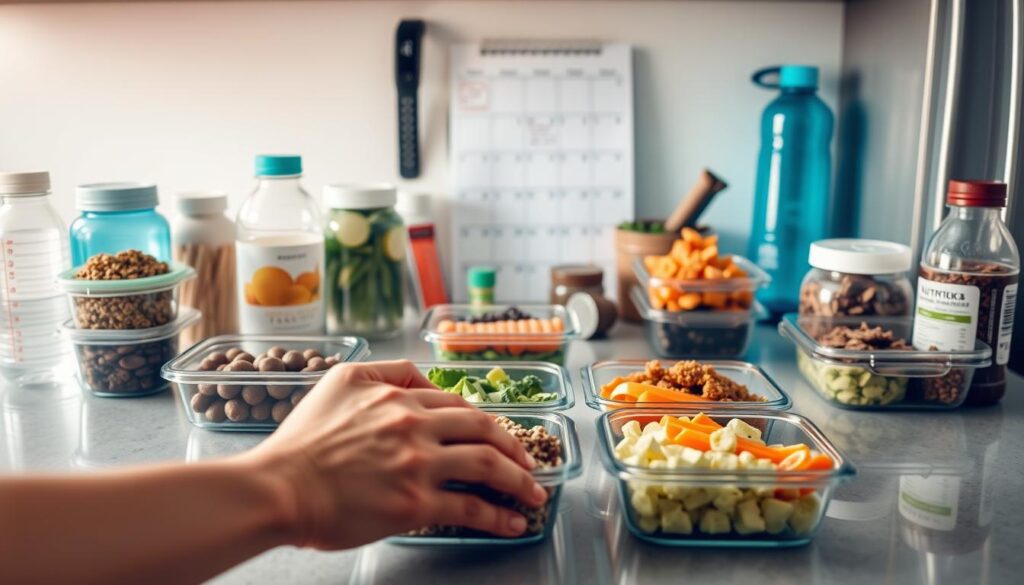You’ve crushed workouts all month. Protein shakes clutter your kitchen. But the mirror still shows stubborn fat or stalled muscle growth. Sound familiar? That frustration you feel isn’t failure—it’s a sign your nutrition strategy might be working against you.
Building a stronger body isn’t just about lifting heavier weights. Research shows common nutrition missteps can erase gym progress faster than skipping leg day. Your meals fuel muscle repair, hormone balance, and metabolism—three pillars that determine whether you’ll sculpt lean tissue or store excess fat.
Many active individuals overlook how small dietary choices compound over time. Skipping post-workout meals, underestimating protein needs, or mistiming carbs can leave you feeling drained and plateauing. These errors don’t just slow gains—they increase injury risks and long-term health concerns.
Key Takeaways
- Nutrition directly impacts 80% of fitness results despite workout intensity
- Minor meal timing errors can disrupt muscle recovery for days
- Protein intake needs often exceed what most active people consume
- Hydration levels affect strength output more than pre-workout supplements
- Restrictive diets frequently backfire by slowing metabolic rates
This isn’t about perfection. It’s about aligning your plate with your why—the reason you keep showing up at the gym. Let’s uncover where your current approach might be leaking results, and how simple adjustments can reignite your progress.
Understanding the Role of Nutrition in Fitness Success
Muscle gains require more than just lifting—your plate matters too. What you eat determines whether your body repairs tissue efficiently or struggles through endless plateaus. Think of meals as construction materials: without quality supplies, even the best workout plans crumble.
Fueling Your Engine for Growth
Protein acts like your body’s repair crew, rebuilding fibers torn during workouts. Aim for 0.7-1 gram per pound of body weight daily—a 160-pound person needs 112-160 grams. Skimp here, and you’ll face slower recovery, weaker lifts, and constant hunger that derails progress.
Carbs aren’t the enemy. They’re premium fuel for high-intensity sessions. Pair them with protein to maintain steady energy levels and prevent mid-workout crashes. Quality matters: oatmeal beats sugary cereals for sustained power.
Your Fork Dictates Your Performance
Ever felt sluggish during afternoon training? What you ate three hours prior likely caused it. Balanced meals with lean meats, complex carbs, and healthy fats keep energy stable. Time protein intake every 3-4 hours to maximize muscle-building signals.
Hydration plays silent partner to nutrition. Even 2% dehydration can sap strength by 10%. Drink water consistently—not just during sweat sessions—to maintain peak performance.
Avoid These Top 5 Nutrition Mistakes Fitness Enthusiasts Make
Your fork could be the silent saboteur of your gym efforts. Three common patterns derail progress more than missed workouts – let’s expose these stealthy progress-killers.

The Starvation Paradox
Eating too little stalls growth despite grueling training. Your body needs surplus calories to repair torn fibers. A 2023 Journal of Sports Science study found lifters consuming 18% below maintenance gained 40% less muscle than those in surplus.
Calculate baseline needs using your weight × 16-18. Add 300-500 calories on training days. Track intake for three days – most underestimate by 20%.
Clock Your Nutrients
Pre-workout timing matters more than you think. Consume 20-30g protein + 40g slow-digesting carbs 60-90 minutes before lifting. This combo elevates amino acids during training, boosting protein synthesis by 33% (International Journal of Nutrition).
Post-session, prioritize fast-acting carbs like rice cakes. They spike insulin, shuttling nutrients into hungry muscles.
Weekend Warfare
Two days of poor choices erases five days of discipline. Alcohol particularly disrupts progress:
- Dehydrates cells, reducing strength output
- Slows protein synthesis for 48 hours
- Adds empty calories that displace muscle fuel
Stick to 1-2 drinks max post-workout. Hydrate with electrolyte water between alcoholic beverages to minimize damage.
Mastering Meal Timing and Consistency for Better Performance
Your clock might be the missing piece in your fitness puzzle. What you eat matters, but when you eat determines whether nutrients build muscle or gather dust in storage. Research reveals precise timing amplifies results by 22% compared to random meal patterns.

Pre-Workout and Post-Workout Nutritional Strategies
Fueling workouts starts 60-90 minutes beforehand. Combine 20-30g fast-digesting protein with 40g oats or sweet potatoes. This primes amino acid levels when muscles need them most. A 2024 Sports Medicine study found this combo boosts strength output by 18%.
Post-training, prioritize speed over quantity. Whey protein triggers insulin spikes equal to white bread—no extra carbs needed unless you trained fasted. “20-40g protein within 30 minutes maximizes repair,” states Dr. Lena Torres, exercise physiologist. Add 50g carbs only if you did multiple high-intensity sessions.
Advanced lifters face tighter deadlines:
- Consume protein within 20 minutes post-workout
- Novices get 2-hour windows for similar effects
- Missed timing? Double protein at next meal
Pair these strategies with consistent 3-4 hour meals. Your body thrives on rhythm—irregular intake confuses muscle-building signals. Track intake for three days. You’ll spot patterns sabotaging your progress.
Supplement Pitfalls and the Importance of Whole Foods in Your Diet
Your supplement shelf might be stealing gains from your plate. While powders and pills offer convenience, they can’t replicate the nutrient synergy of real food. Smart supplementation enhances results—overreliance creates gaps in your nutritional foundation.
Smart Use of Protein Shakes and Proper Supplement Dosing
Research shows 20-25g whey protein maximizes muscle-building signals post-training. Larger athletes may need 40g, but more isn’t better—excess gets converted to energy or stored. Use shakes as tactical tools: 1-2 daily around workouts covers 10% of total protein needs.
Creatine proves this principle. The International Society of Sports Nutrition confirms 3-5g daily works long-term—no need for 20g loading phases. “Supplements fill cracks in your diet,” notes sports dietitian Dr. Elena Marquez. “They shouldn’t become the foundation.”
Meal Prep Strategies to Avoid Processed “Healthy” Foods
Packaged bars and snacks often hide sugars and artificial additives. Build meals around unprocessed sources:
- Overnight oats with walnuts > protein bars
- Grilled chicken wraps > “low-carb” frozen meals
- Hard-boiled eggs > shake-and-go powders
Whole food proteins deliver iron, zinc, and healthy fats missing in isolates. Spend Sundays roasting vegetables and portioning lean meats—you’ll avoid midweek processed food traps while hitting 90% whole food targets.
Conclusion
Transforming your results starts with small, consistent changes—not extreme overhauls. Focus on fixing one leaky habit each week, like carrying a water bottle or prepping protein-rich snacks. These tweaks compound faster than you think.
Dehydration quietly sabotages more people than missed workouts. When your body lacks just 2% water, it struggles to digest food and maintain energy. Aim to drink half your weight in ounces daily—add 8oz for every 30 minutes of exercise.
Meal timing acts as your secret weapon. Eating every 3-4 hours keeps metabolism active and prevents energy crashes. Pack hard-boiled eggs or Greek yogurt for busy days. Your body thrives on rhythm, not random feast-or-famine patterns.
True progress comes from aligning your plate with your goals—not perfection. Prioritize water intake, plan three nutrient-dense meals, and watch how simple adjustments elevate both gym performance and daily vitality.
